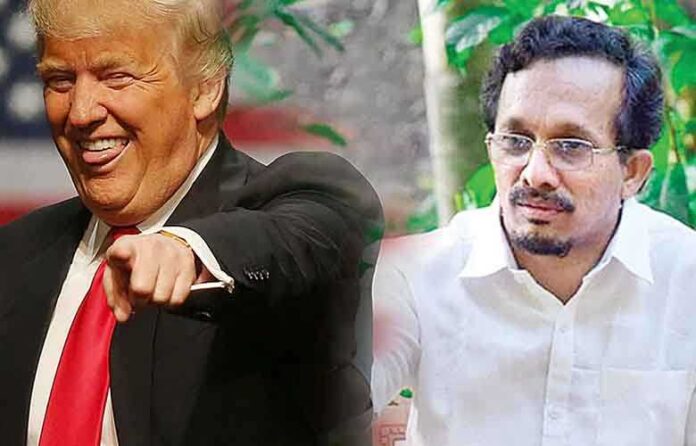By: Staff Writer
April 06, Colombo (LNW): Sri Lanka has been thrust into an external trade crisis following U.S. President Donald Trump’s imposition of steep tariffs on the island nation’s exports. This decision, long in the making, appears to have taken Sri Lanka by surprise, raising questions about the government’s preparedness or potential oversight in assessing the situation.
Minister of Industry and Entrepreneurship Development, Sunil Handunneththi, publicly expressed alarm over the new tariffs, calling them both unexpected and economically damaging. “This came as a shock,” he stated, adding that the 44% tariff could derail the government’s goal of boosting exports by $3 billion.
He went on to criticize the methodology behind the tariff rate, describing it as “unfair,” since it was based on halving the trade deficit between the two countries—effectively penalizing Sri Lanka disproportionately.
Handunneththi further pointed out that the U.S. had no immediate political reason to target Sri Lanka, and lamented the timing of the decision just as the nation was beginning to regain economic stability.
His remarks exposed what many see as either negligence or willful ignorance on the part of Sri Lanka’s leadership, given that Trump’s protectionist trade stance has been globally recognized since his first term.
Trump’s tariff-heavy policies are not new. During his first presidency, he initiated a trade war with China, applying heavy duties on Chinese goods, which led to retaliatory measures. Similar tactics were used to renegotiate trade agreements with Canada and Mexico under the U.S.-Mexico-Canada Agreement (USMCA). President Joe Biden retained most of those tariffs, albeit with a more selective approach.
Trump’s renewed presidency has brought an even more aggressive push. Since taking office again, Trump has signed multiple executive orders. In January, he proposed a 25% tariff on Canada and Mexico, and later extended the tariffs to Colombia after diplomatic tensions.
By early March, Trump had implemented new tariffs: 25% on imports from Canada and Mexico, 20% on Chinese goods, and new measures targeting timber and lumber to “protect national security.”
On April 2, Trump introduced his long-planned “reciprocal” tariffs, applying a 10% baseline on all imports and higher rates for countries with trade surpluses with the U.S. The European Union responded with its own retaliatory duties on U.S. products like bourbon, jeans, and peanut butter, although implementation was delayed to mid-April.
Given this global backdrop, Handunneththi’s claim of surprise appears questionable. Trump’s agenda of imposing reciprocal tariffs has been clear and consistent. Yet Sri Lanka failed to prepare or engage in early dialogue, leaving the nation vulnerable.
Currency dealers have already noted downward pressure on the Sri Lankan rupee following the 44% tariff announcement. A leading dealer said the rupee could further weaken if Sri Lanka fails to negotiate a better deal, citing reduced dollar inflows and a growing trade deficit.
In response, President Anura Kumara Dissanayake has appointed a special committee to assess the tariff’s impact and strategize a response. A meeting held at the Presidential Secretariat reviewed the committee’s recommendations, with expectations for urgent bilateral discussions with the U.S. to seek tariff relief.
Sri Lanka’s internal economic structure—characterized by protectionist policies and high import taxes that favor a few politically connected industries—has long hampered its export competitiveness. Trump’s strategy, favoring hardline border taxes over diplomatic requests, has pushed countries worldwide into renegotiations, often under pressure.
Trump, addressing media aboard Air Force One, proudly claimed that countries are now eager to deal with the U.S. due to these tough tariffs. “If we asked nicely, most wouldn’t respond. But now they’ll do anything for us,” he said.
Historically, the U.S. thrived as a liberal trading nation during the 1980s and 1990s. However, following years of monetary expansion and rising inflation, Trump has adopted a bold strategy: reduce domestic taxes while leveraging international tariffs to regain control over trade.
For Sri Lanka, this episode serves as a wake-up call. It highlights the need for proactive economic planning, diplomatic agility, and policy reform to remain competitive in a rapidly evolving global trade landscape.

